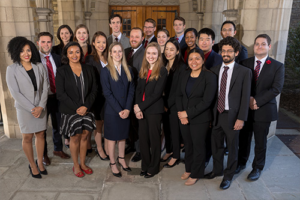Chaudhuri and Cohen are among twenty-three members of the 2018 class who will clerk for state and federal judges from Texas to Washington State after they leave Cornell Law School. The soon-to-be graduates were celebrated with a champagne toast by faculty, alumni, and staff on April 23 at Myron Taylor Hall.

2018 graduates who received clerkships.
Chaudhuri will not only clerk for Judge Kenneth Karas of the U.S. District Court of the Southern District of New York in White Plains for a year, but she will then clerk for Judge Rosemary Pooler of the U.S. Court of Appeals for the Second Circuit in Syracuse, beginning in 2020.
“I think it’s going to be really beneficial to go behind the scenes and see what it looks like on the other side deciding matters at the trial or appellate level,” Chaudhuri said. “Having that insight is going to be really helpful when I start work as a lawyer.”
Cohen will clerk for U.S. District Court Judge Brian Cogan ’79, who sits in the Eastern District of New York in Brooklyn next year. “I want to be the best litigator that I possibly can be and by clerking in a district court, which is the trial level, you get experience that you really can’t receive anywhere else,” said Cohen, who was editor in chief of the Cornell Law Review from 2017 to 2018.
Cornell Law School has seen a steady increase in the number of clerkships since Elizabeth Peck was appointed assistant dean for professional development and clerkships in 2015. The number of law school students and alumni who received clerkships in 2017 was fifty-seven, a record level.
“Nearly 60 clerkships for Cornellians per year is the equivalent of 30 percent of our JD class clerking,” Dean Eduardo Peñalver, the Allan R. Tessler Dean and Professor of Law, said at the clerkship celebration. “That is a remarkable achievement.”
The Law School’s emphasis on enhancing relationships with judges and supporting clerkship seekers was part of the decision to rename Peck’s department this year as the Office of Judicial Engagement, reflecting the school’s focus on making connections with the judiciary.
“While we continue to support our clerkship seekers in every way we can, we recognize that our mandate is also to strengthen the relationships between judges and the Law School as a whole,” Peck said.
The clerkship celebration, launched last spring, is another new effort to highlight the importance of helping students earn clerkships. This year’s event was attended by John Blume, the Samuel F. Leibowitz Professor of Trial Techniques and chair of the faculty clerkship committee; and Judge Richard Wesley ’74 of the U.S. Court of Appeals for the Second Circuit.
“The clerkship celebration is an integral part of the festivities surrounding graduation,” Peck said. “By bringing these graduating clerks together as they leave Myron Taylor Hall, we are strengthening the Cornell clerkship family and supporting these clerks and those who will come after them.”